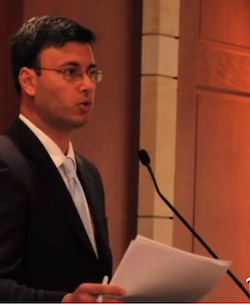World Health Organization (WHO)
See the following -
Uganda Launches National Health Workforce Information System Built on iHRIS
On February 7, the Uganda Ministry of Health (MOH) and USAID/Uganda jointly launched the country’s Human Resources for Health Information System (HRHIS), which provides up-to-date information on the country’s health workforce for evidence-based decision-making. Vice President Edward Kiwanuka Ssekandi presided over a launch ceremony at the Hotel Africana; Minister of Health Honorable Richard Nduhura delivered a speech and held a press conference.
- Login to post comments
Unchecked Superbugs Could Kill 10 Million A Year, Cost $100 Trillion (United Kingdom)
Drug-resistant superbugs could kill an extra 10 million people a year and cost up to $100 trillion (£63.68 trillion) by 2050 if their rampant global spread is not halted, according to a British government-commissioned review...
- Login to post comments
Up To Half Of Antibiotics 'Fail Due To Superbugs' Study Finds
GPs are increasingly handing out antibiotics that turn out to be useless, as up to half of courses of the drugs 'fail' and result in further treatment, a study has found.
Groundbreaking research has analysed 11m courses of antibiotics prescribed to British patients over the last 22 years covering the most common diseases areas including tonsilitis, pneumonia and ear infections...
- Login to post comments
Upcoming Vote on the Biomedical R&D Treaty
For almost a decade, the United States has been standing in the way of an idea that could lead to cures for some of the world's most devastating illnesses. The class of maladies is known as neglected diseases, and they almost exclusively affect those in the developing world. Read More »
- Login to post comments
US Lawmaker: Ban Travel To US From Ebola-Stricken Countries
A U.S. congressman has asked the Obama administration to impose an immediate travel ban on the citizens of Guinea, Liberia and Sierra Leone, as well as on foreigners who have visited those countries, to contain the spread of Ebola to the United States...
- Login to post comments
US Provides $40 Million To Tackle Infectious Diseases
Developing countries will receive extra support to prevent, detect and respond to health threats as the US government announced plans last month (13 February) to boost funding for nations at high risk from infectious disease. Read More »
- Login to post comments
Using 3D Printers to Tackle Gaza's Medical Shortages
The stethoscope, a staple device in modern medicine, is a luxury item in Gaza. At Gaza's largest hospital, al-Shifa, there are only one or two stethoscopes in each department; doctors left without one resort to pressing their ears against patients' chests to diagnose an illness. "That would be the best-case scenario," Canadian doctor Tarek Loubani told Al Jazeera. "If someone's full of blood, most doctors aren't going to put their ears to the chest. So, doctors are making decisions without that piece of information"...
- Login to post comments
Using Open Technology To Build a Biodefense Against the Coronavirus
 As the number of US cases of the coronavirus rises, how will healthcare professionals be able to tell the difference between which panicked patients with similar symptoms has what? Even if the patient hasn't traveled to Wuhan or China recently, what if they sat at a Starbucks with someone who did? With the incubation time-lag before symptoms appear, who would even know? The challenge of monitoring 330 million people for infectious disease outbreaks is daunting. Take the flu as an example. During the last flu season which, as already discussed, was not as complex as this year's season, approximately 35.5 million Americans had flu symptoms, 16.5 million received medical care, 490,600 were hospitalized and 34,200 died.
As the number of US cases of the coronavirus rises, how will healthcare professionals be able to tell the difference between which panicked patients with similar symptoms has what? Even if the patient hasn't traveled to Wuhan or China recently, what if they sat at a Starbucks with someone who did? With the incubation time-lag before symptoms appear, who would even know? The challenge of monitoring 330 million people for infectious disease outbreaks is daunting. Take the flu as an example. During the last flu season which, as already discussed, was not as complex as this year's season, approximately 35.5 million Americans had flu symptoms, 16.5 million received medical care, 490,600 were hospitalized and 34,200 died.
- Login to post comments
VNI Service Award Finalist Pierre Omadjela Uses FrontlineSMS To Raise Malaria Prevention Awareness In The Democratic Republic Of The Congo
[...] The President’s Malaria Initiative, launched in 2005 through USAID, provides malaria prevention and treatment in five provinces, which make up 26% of the DRC’s health zones. Read More »
- Login to post comments
We May Have Reached The 'Apocalyptic Scenario' With Antibiotics
Centers for Disease Control and Prevention director Tom Frieden made headlines last year when he proclaimed that the United States would "soon be in a post-antibiotic era," meaning we'd be plagued by everyday infections that our drugs could no longer handle...
- Login to post comments
Web-Based Tool Was First To Spot Ebola
Crowd-sourced technology saw the [Ebola] outbreak taking place in real-time, before WHO announcement...
- Login to post comments
What If It Happened Again? What We Need To Do To Prepare For A Nuclear Event
 As we observe the 70th anniversary of the bombings of Hiroshima and Nagasaki, it may seem like the threat from nuclear weapons has receded. But it hasn’t; the threat is actually increasing steadily. This is difficult to face for many people, and this denial also means that we are not very well-prepared for nuclear and radiological events. I’ve been studying the effects of nuclear events – from detonations to accidents – for over 30 years. I’ve been involved in research, teaching and humanitarian efforts in multiple expeditions to Chernobyl- and Fukushima-contaminated areas. Now I am involved in the proposal for the formation of the Nuclear Global Health Workforce.
As we observe the 70th anniversary of the bombings of Hiroshima and Nagasaki, it may seem like the threat from nuclear weapons has receded. But it hasn’t; the threat is actually increasing steadily. This is difficult to face for many people, and this denial also means that we are not very well-prepared for nuclear and radiological events. I’ve been studying the effects of nuclear events – from detonations to accidents – for over 30 years. I’ve been involved in research, teaching and humanitarian efforts in multiple expeditions to Chernobyl- and Fukushima-contaminated areas. Now I am involved in the proposal for the formation of the Nuclear Global Health Workforce.
- Login to post comments
White House Actions On Antibiotic Resistance: Big Steps, Plus Disappointments
The United States government proposed several important steps last week that, if accomplished, will significantly change how this country attempts to counter the advance of antibiotic resistance, bringing us within reach of the more complete programs which exist in Europe. But as significant as it is, the new program has some perplexing gaps that left experts attending to the issue disappointed...
- Login to post comments
WHO Admits Fudging Ebola Response, Blames ‘Incompetent Staff’, Swine Flu Experience
The World Health Organization (WHO) has admitted that its initial response to the Ebola outbreak was slow and disorganized, blaming a lack of information sharing, incompetent staff and the negative experience in the Swine Flu pandemic of 2009...
- Login to post comments
WHO Credits mHealth App With Helping Nigeria Get Rid Of Ebola
The World Health Organization has declared Nigeria free of the Ebola virus transmission, and public health agencies are declaring that an mHealth initiative deserves much of the credit...
- Login to post comments